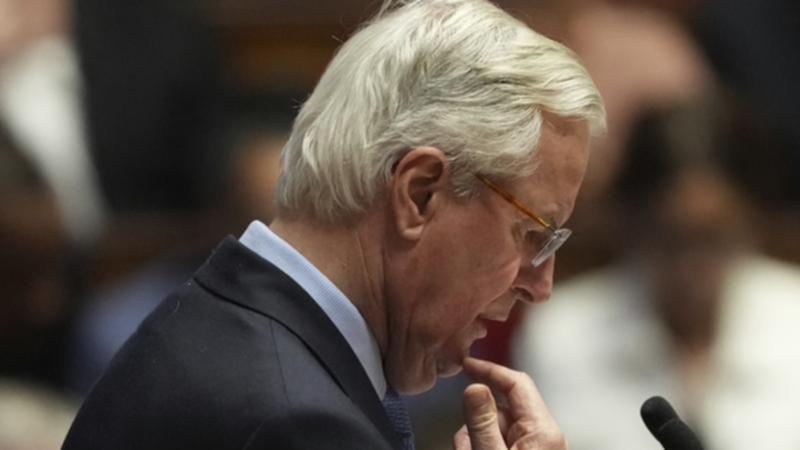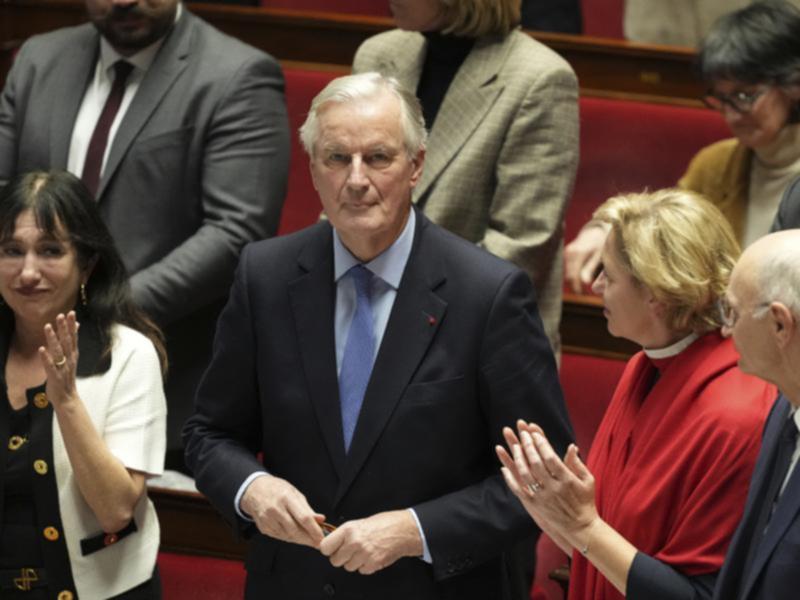THE NEW YORK TIMES: What to expect as France’s Prime Minister Michel Barnier falls
THE NEW YORK TIMES: France’s Prime Minister, Michel Barnier, lost a no-confidence vote, leaving the country without a functioning government or a clear path to a budget as it enters the new year.

France’s prime minister, Michel Barnier, lost a no-confidence vote Wednesday, leaving the country without a functioning government or a clear path to a budget as it enters the new year.
It was the first successful no-confidence vote in France in more than 60 years and made Barnier’s 3-month-old government the shortest-tenured in modern French history.
French news media reported that Barnier was expected to hand in his resignation to President Emmanuel Macron on Thursday morning. Macron was expected to address the nation later Thursday in an 8 p.m. televised speech.
Sign up to The Nightly's newsletters.
Get the first look at the digital newspaper, curated daily stories and breaking headlines delivered to your inbox.
By continuing you agree to our Terms and Privacy Policy.What is the latest?
Barnier and his government were targeted by a successful no-confidence motion that had been filed this week after he had pushed a social security spending bill through the lower house of parliament without a final vote.
The no-confidence motion was filed by an alliance of left-wing parties called the New Popular Front and supported by Marine Le Pen’s nationalist, anti-immigrant National Rally party and its allies.
With 331 votes in favor, the motion easily cleared the 288-vote threshold — more than half of the total number of lawmakers elected to the lower house — required to succeed.
Barnier and the Cabinet now have to resign, but not Macron. As a byproduct, the spending bill is also rejected, and Barnier’s other budget bills, which include the general state budget for 2025, are in limbo.
What does it mean?
Is France hurtling toward a constitutional crisis, or a U.S.-style government shutdown in which civil servants are unpaid and departments are unfunded?
Not exactly. France’s Constitution offers several scenarios that could keep the country’s affairs more or less in order, at least in the short term, and the country’s laws provide for continuity in the absence of a government and a budget.
But the political turmoil that has gripped France since Macron called snap elections last summer is worsening, and the country’s struggling economy could pay a hefty price after the collapse of Barnier’s government.
France’s large debt and deficit “will not disappear by enchantment,” Barnier told lawmakers Wednesday, as he warned of rising interest rates, flailing purchasing power and declining investment.
The collapse of his government, he added, “will make everything more serious and more difficult.”
How did France get here?
The results of the elections that Macron called last summer were disastrous for his party and its allies. But instead of naming a politician from the leftist coalition that won the most seats in the election, Macron called on Barnier, a figure from the traditional centrist right. The leftist coalition was furious.
“We knew from Day 1 that he was going to fall,” Mathilde Panot, a top lawmaker for the leftist France Unbowed party, told reporters Wednesday. His appointment, she added, “was a provocation against the French people’s vote.”
Since then, Barnier has been living “the hell of Matignon,” a phrase used by political commentators to describe the difficulties of reigning from Matignon Palace, seat of the government, where a prime minister has some power, but hardly all of it. That was especially true for Barnier, who had to work with a bitterly divided lower house of parliament where no party or bloc has a majority and few are inclined to work together.
Barnier was supported by a tenuous coalition of conservatives from his own party and centrists that support Macron. But he was unable to fend off challenges from the left and far right against his budget, an unpopular $60-billion mix of spending cuts and tax increases.

What happens next?
Once Barnier resigns, his government will enter caretaker mode until a new one is appointed.
Macron’s previous government also drifted along in caretaker mode from July to September. It was empowered under the constitution to handle “current affairs” but was limited in its powers.
No legal texts detail exactly what those limits are, but French jurists agree that a caretaker government can’t propose new laws or issue new decrees. It can take care of government business: paying workers and distributing pensions, for instance. The Cabinet no longer meets.
It is up to Macron, once again, to appoint a new prime minister. He can take his time, and he can appoint whomever he likes — and not necessarily someone from the majority party in parliament. The country’s economic predicament could push him to act fast, but finding someone who can avoid Barnier’s fate could prove challenging.
What about the budget?
The budget itself has entered a kind of limbo. Without a functioning government, the budget proposed by Barnier is essentially dead on arrival. If Macron acts quickly and appoints a new prime minister before the end of the year, a new government budget could be submitted, and parliament would have 70 days to examine it.
But that would still mean France would not have a spending law by the new year. Under French law, the government could simply propose a “special measure” reapplying the 2024 budget. Civil servants would be paid and taxes would remain at their current level.
If parliament refuses to go along or does not hold a vote, Macron could invoke his extraordinary constitutional powers and simply impose a budget. But jurists agree that the political consequences of such an untested move could be severe, especially at a time when the French president is increasingly challenged for failing to respect the voice of French voters.
What happens to Macron?
Under France’s constitution, Macron will remain as president until his term expires in 2027, but it seems almost certain that his stature will be diminished. Some politicians on both the left and the right are calling for his resignation. Analysts say Le Pen is especially eager to trigger an early presidential election.
“I’m not demanding Emmanuel Macron’s resignation,” Le Pen told TF1 television Wednesday. But, she said, “pressure on the president of the Republic will get increasingly strong.”
“The final decision is his,” she added.
So far, though, Macron has resisted calls to step down, saying they are far-fetched. His term is limited, and he cannot seek another consecutive stint in office.
This article originally appeared in The New York Times.
© 2024 The New York Times Company
Originally published on The New York Times
